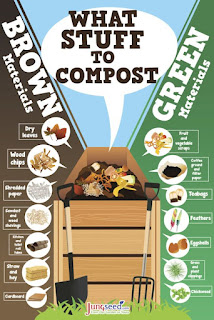Being more sustainable in the kitchen is overwhelming I know. I listened to a podcast last year that really made it less overwhelming for me. It stressed how it's impossible to go from nothing to a complete green lifestyle at once. The key is to start with one thing that you can change and go from there.
In this post I am going to give some options of ways you can go green in the kitchen. I don't want it to be overwhelming so if you decide to make a change...start small. Pick one thing you think you can do. To be honest, I don't do all of these things either. I still am working on small changes as well.
1. Eat less meat
This does not mean you have to go vegetarian or vegan. It can be as simple as cutting back on meat one a month or once a week. Incorporate Meatless Mondays into your schedule. It's a great time to experiment with new recipes.
2. Cut back on paper products
Again, this does not mean you can no longer use paper products. It could be picking one thing to replace first then add on later. It could be switching to a more sustainable type of paper product like bamboo. You can choose to use dish towels or Swedish dishcloths instead of paper towels, cloth napkins instead of paper, use bamboo paper towels. Instead of paper bags try to use reusable bags.
3. Use less plastic
This is not recycling that comes later. This is replacing your plastic with other eco-friendly options. You can use reuseable bags instead of plastic bags, replace plastic containers with glass ones, use produce bags, use resuseable water bottles and coffee mugs.
4. Recycle/Reduce/Reuse
Start a recycling program, find ways to reuse items (ie: glass jars), reduce what you use. Don't buy what you don't need.
5. Waste Food Less
This goes hand in hand with step 4. A good way to do this is to meal plan. Only buy what you need. And leftovers are your friends. If you don't eat all of your meal, don't throw out the leftovers. Either eat the leftovers for lunch, learn to make less, or better yet share a meal.
6. Compost
There are certain things we don't eat of say veggies and fruits like stems and seeds. There are green and brown materials that can be composted. The ideal compost ratio is 2/3 brown to 1/3 green. You should turn your compost weekly and add water so the contents stay moist.
7. Buy food in bulk
Not only does this reduce your packaging (plastic/paper), often it is cheaper. The trick...do you have the space to store the bulk items. Don't buy bulk anything that is going to go bad or be wasted.
8. Shop local
Shopping local has many benefits. It is cheaper to transport and uses less energy to transport. If you buy local, you are supporting small business owners and not large corporations. This also means a lot more of your items are US made products. Shopping local at farmers markets and greenhouses also means that your produce is fresher, lasts longer, and is better quality.
9. Buy sustainable products
When you are in the market for new products think sustainable. How does the item impact the environment, is there a better made product, is there a cheaper alternative, or is there an alternative that I can reuse? Things that are popular are silicone items (like muffin cups, hotpads, baking mats, etc), jars for storage, long lasting items when looking or things like cookware, and buying from companies that are eco-friendly (ie burlap and barrel).
10. Educate yourself
A couple ways to educate yourself is to listen to things like podcasts, listen to experts, and shop at places that focus on sustainability. A podast/blog I have liked is Brightly Eco. They cover all types of items that are sustainable and have an online shop, they also cover everything from kitchen to fashion to pet supplies. They have the Good Together podcast that has a lot of good information.
Another way to educate yourself is to check out a refillery. Springfield IL has a local refillery, The Keep Store, It is a local refillery that is almost zero waste. You can bring your own containers, or they have containers there you can buy, You can also leave a container if you have extras. They have everything from personal care items to kitchen items, kids items, toys, soaps, etc. You can order online for pickup and they have recently started a Terracycle program for drop off recycling for certain items.









.jpg)





No comments:
Post a Comment